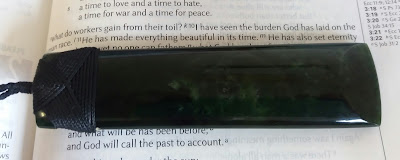This image has been my focus for reflection this
Christmas. I’ve got four Children and one of the most vivid memories I have of
their births is that moment I first held them and I put my figure down to touch
their little hands and their fingers closed around mine. Now I know that it is
simply a grasp reflex at that stage, but it felt like a recognition and
connection. The start of what has been a great adventure and joy in knowing my
kids and having our relationship grow and change as they have grown and
changed. Having it mature as they and hopefully I have grown and matured.
So the image behind me has all that personal stuff in it.
You’ve probably got your own memories and moments that connect with it. But I’ve
also used it this year to get my head round the fact that at Christmas we both
celebrate the birth of a simply human baby and amazing and mind-blowing truth
that as we had read out in John’s Gospel the eternal word of God, that was
there before the beginnings, the one who created it all, became one of us.
When I was young we used to borrow a friend’s batch up north
for Christmas Holidays and I remembered driving through Orewa on the way up
north and passing the camping ground and seeing the tents all pushed up against
each other, and John uses that kind of kiwi holiday image to express that God become
one of us… He says the word became flesh and pitched his tent at our place. Of
course for John it wasn’t camper at Orewa that he had in mind, rather, the
tabernacle that accompanied Israel through there wilderness wanderings and was
for them the place where God dwelt in their midst. When they became a nation,
it was the temple in Jerusalem. But that God in our midst had even got closer.
God steps into a world in the grips of political unrest, in
Jesus he steps right into the midst of life’s nitty gritty. Luke starts his
Christmas narrative with Augustus as the roman emperor and Herod as the ruler
under him in Judea. The family is forced to go to Bethlehem to register, so
that taxes can be levied and collected.
He steps into a housing crisis, there is no room except a stable. God’s
coming into the world is like a family living in a garage in South Auckland.
There is political turmoil, in Matthews gospel which we didn’t read today ,Herod
does not want a possible rival to his power so sends death squads to kill all
the male children under two in Bethlehem, the Christmas stories finishes like
any conflict situation event today with mothers crying for their slaughtered
children and Jesus family fleeing for
safety as refugees to another land.
God’s steps into our world and come to grips with its pain and sorrow,
its hardship and its joy.
Like with my kids, Jesus born in Bethlehem grew up as well,
john tells us that in Jesus we beheld God’s truth and grace. People were
gripped by his teaching, about God’s love and a new of living because of it,
caring for the poor, the lost and the least, the kingdom of God. They were
gripped by him he reached out and welcomed back those though outside and
cut-off, he reached out into sickness and bought healing.
When he was rejected by the powers to be, his hands were
gripped, and nailed to a cross, a roman torture and execution device, and he died.
The gospel tells us that three days later he rose from the dead and his
disciples gripped him again and saw the nail prints and knew it was true. Since
that time the world has found itself having to come to grips with this Jesus
born in Bethlehem: his offer of forgiveness and new life lived in relationship
with God through him and a call to live out his teaching by loving one another.
They have to come terms with Immanuel God with us…
Well returning to the image that has been the centre of my
reflections this Christmas, I find that it not only shows the reality of God
becoming a human being but also that I find in my life I am gripped by Jesus
Christ.
I find him gripping and compelling.
I am gripped by God’s great love for us. God’s welcoming
embrace
I am gripped by
Christs rich mercy when I see my own spiritual poverty
I am gripped by Jesus death on the cross, the fact that
through that all I have done is forgiven, the slate is whipped clean,
I am gripped by the offer of new life in Christ, a life of
Hope, peace and joy and love. The themes that go with the advent candles we lit
this morning.
I am gripped by his
teaching and its call for us to follow him and live a life full of sacrificial
service and love for others, to forgive as we have been forgiven, to show
compassion and grace as God’s grace has been shown in Christ.
I am gripped by the
reality of Immanuel, God with us, God’s abiding presence through the Holy
Spirit, to lead and to Guide,
I am gripped by the
possibility of light in the face of the same darkness in the world today as the
one Jesus was born into.
I am gripped by God’s kingdom and justice breaking into the
powers of this world, not with over whelming force or shock and awe, but in
kindness and compassion, humility and seeking justice. Treating all with dignity (because they are loved by God) and grace.
I am gripped by Jesus
This Christmas hopefully the simple of image of a baby’s
grip reflex helps us to come to grips with Jesus, Immanuel, God with us… That
God has drawn near and become one of us, that God’s truth and grace has been
revealed to us, shown in Jesus teaching his life, death and resurrection. That
you might come to grips with that reality, you might now the presence of
Immanuel God with us. Come to grips with who Christ is.















































.jpg)